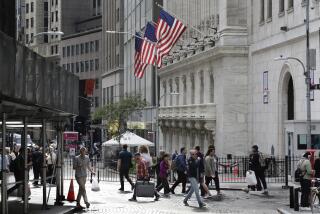Stock indexes fall on worries over Egypt
U.S. stock-index futures fell as investors speculated that Egypt’s crisis would slow the global recovery.
Futures on the Standard & Poor’s 500 index expiring in March tumbled 0.4% to 1,267 during trading Monday morning in Tokyo, while Dow Jones industrial average futures retreated 79 points, or 0.7%, to 11,696. Middle East shares sank Sunday, sending Abu Dhabi’s index down 3.7%, its biggest drop in 14 months.
“The situation in Egypt is the catalyst for a downturn,” said James Paulsen, chief investment strategist at Minneapolis-based Wells Capital Management, which oversees about $340 billion. “We have a market that is vulnerable to a technical correction. There’s an investor mindset that’s been expecting that to happen for a while now, given where the market is and how fast it’s come up.”
Oil, meanwhile, advanced for a second straight day in New York, with crude for March delivery climbing as much as 1% to $90.19 a barrel Sunday in electronic trading on the New York Mercantile Exchange. Stoked by fears that unrest in the Middle East could disrupt fuel supplies, oil futures increased 4.3% on Jan. 28, the most since September 2009. Any disruption to Middle East oil supplies could “bring real harm,” U.S. Energy Secretary Steven Chu said on a conference call.
The S&P 500 has surged 22% since Federal Reserve Chairman Ben S. Bernanke said Aug. 27 that he was prepared to take action to help the economy. Stocks fell last week, thwarting the longest stretch of weekly gains for the Dow average since 1995, as unrest in Egypt triggered the biggest one-day drop in the gauge since November and overshadowed higher-than-projected earnings at Intel Corp. and DuPont Co. and other companies.
Demonstrations in Egypt continued over the weekend. The Bloomberg GCC 200 index — composed of Saudi Arabia, Qatar, the United Arab Emirates, Oman, Bahrain and Kuwait — lost 0.3%. Egypt’s market was closed after sliding 16% last week. Australia’s S&P/ASX 200 index dropped 0.8% to 4,734.90. Japan’s Nikkei 225 index retreated 1.4% to 10,219.61.
Concern that instability in Egypt could hinder oil exports through the Suez Canal overshadowed a report showing the U.S. economy expanded 3.2% in the fourth quarter. Consumer purchases, about 70% of the economy, rose at a 4.4% pace, the most since the first quarter of 2006, signaling that the world’s largest economy and consumers are recovering from the worst recession since World War II. New-home purchases in the U.S. also rose more than forecast last month, Commerce Department figures showed last week.
More to Read
Inside the business of entertainment
The Wide Shot brings you news, analysis and insights on everything from streaming wars to production — and what it all means for the future.
You may occasionally receive promotional content from the Los Angeles Times.










